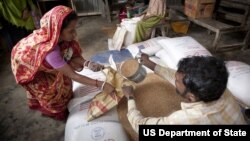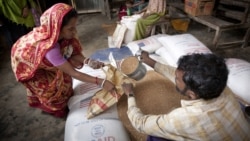It is important for the U.S. to continue using its strength to maintain and promote peace and democracy around the world, Secretary of State John Kerry recently told a group of visiting students at the U.S. State Department:
“America, throughout the 20th century and now moving into this century has proven again and again that there is an indispensable capacity to help bring about peace, find a way for people’s rights, their individual human rights to be able to be protected and to be able to live better lives.”
Secretary Kerry mentioned several countries including Iraq, Kosovo, Bosnia and Serbia where the United States has worked to help ensure that people have a choice in how they are governed and are able to play a role in determining the future of their country. “My own belief is that there has to be more to our efforts,” said Secretary Kerry, noting, “We’re in a more complicated world.”
What we have learned from the Arab Spring is that governments must be responsive to their populations and provide opportunities for the young emerging working class. Addressing the students, Secretary Kerry noted,:
“I believe it’s time for us … to help these folks be able to find the kind of opportunity that you have and that a lot of other people strive for in different parts of the world.”
The food, health, education and other aid programs that help to promote U.S. foreign policy abroad should not be viewed as expenses. They are investments, Secretary Kerry explained, and the return on these investments is stronger relationships with other countries that will help the United States peacefully and diplomatically resolve conflicts. The need to deploy U.S. troops to solve problems will diminish over time and as global citizens benefit from more open, free and fair economies, we all benefit.
“Foreign policy is about making tough decisions,” said Kerry. It’s about “seeing the future and trying to prepare for that future.”
“America, throughout the 20th century and now moving into this century has proven again and again that there is an indispensable capacity to help bring about peace, find a way for people’s rights, their individual human rights to be able to be protected and to be able to live better lives.”
Secretary Kerry mentioned several countries including Iraq, Kosovo, Bosnia and Serbia where the United States has worked to help ensure that people have a choice in how they are governed and are able to play a role in determining the future of their country. “My own belief is that there has to be more to our efforts,” said Secretary Kerry, noting, “We’re in a more complicated world.”
What we have learned from the Arab Spring is that governments must be responsive to their populations and provide opportunities for the young emerging working class. Addressing the students, Secretary Kerry noted,:
“I believe it’s time for us … to help these folks be able to find the kind of opportunity that you have and that a lot of other people strive for in different parts of the world.”
The food, health, education and other aid programs that help to promote U.S. foreign policy abroad should not be viewed as expenses. They are investments, Secretary Kerry explained, and the return on these investments is stronger relationships with other countries that will help the United States peacefully and diplomatically resolve conflicts. The need to deploy U.S. troops to solve problems will diminish over time and as global citizens benefit from more open, free and fair economies, we all benefit.
“Foreign policy is about making tough decisions,” said Kerry. It’s about “seeing the future and trying to prepare for that future.”






